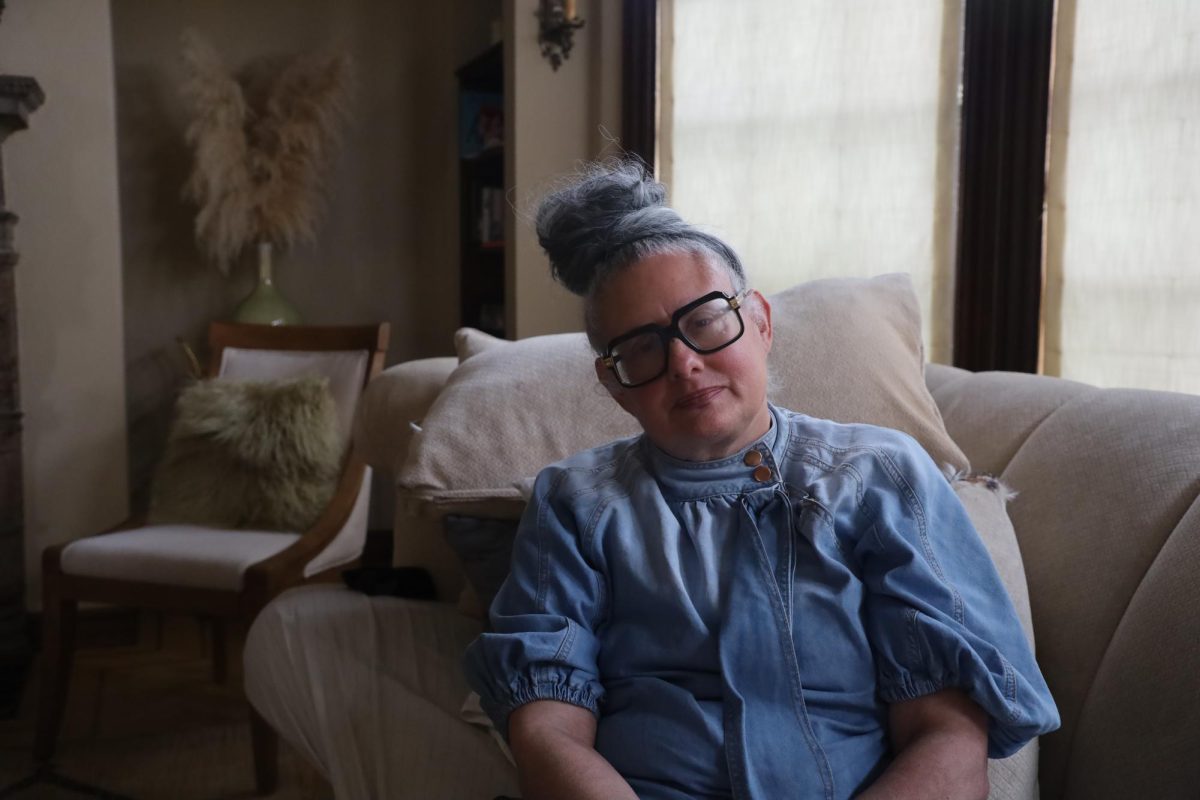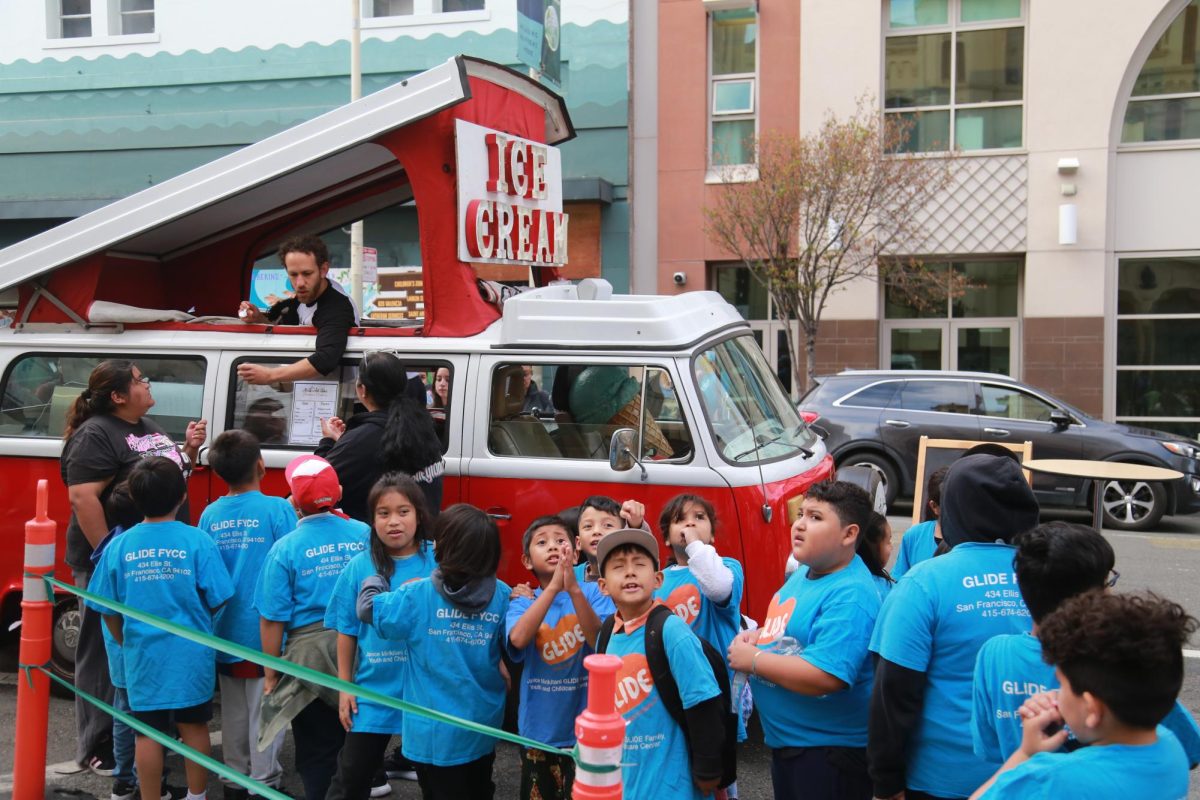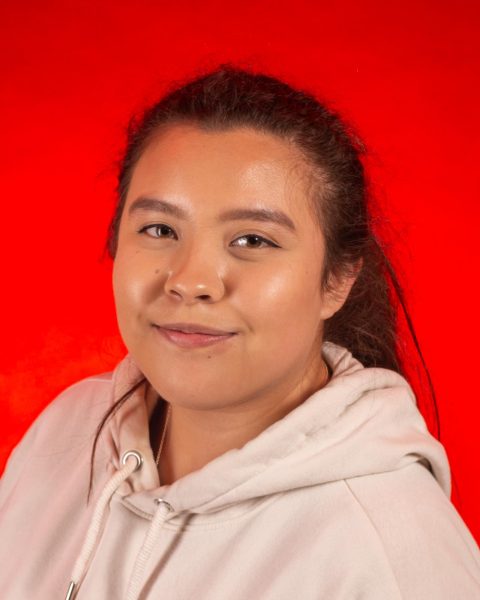As soon as former SF State student Maya Elisabeth turned 18, she received her medical card for cannabis and went to the medical clubs, often making her own edibles. This became a big part of her life, before she knew that the uniquely shaped plant would be a possible career choice and brought her to where she is today. Elisabeth has had her brand OM since 2008, selling products that involve cannabis. Elisabeth’s brand, OM, has two companies: OM Living, dedicated to the THC side, and OM Wellness dedicated to the CBD side.
According to the 2023 report on Diversity, Equity, and Inclusion in the Cannabis Industry, 39% of executives in the cannabis industry are women.
“When I went to San Francisco State, I knew I wanted to work with people,” said Elisabeth. “I didn’t know what I wanted to do but I really enjoyed cannabis… I’m not saying this to brag but only because I want people to know that I had above 4.0 GPA and graduated with honors. So I want people to know it’s not like I was flunking out of school because of weed.”
Elisabeth’s parents were supportive with what she wanted to do.
“Both my parents were high-functioning cannabis users. I used to always smell it on my mom when she would take the dog for a walk. I’d say ‘Mommy, it smells like a skunk in here,’ and she’d say ‘It does smell like a skunk in here,’ ” Elisabeth recalled.
According to Weedless, high-functioning cannabis users are those who routinely use cannabis but are able to maintain a balanced appearance. Weedless uses information on marijuana to guide those thinking or wanting to quit cannabis, but supports the efforts to legalize marijuana use.
Her mother didn’t want to tell her the strong smell was cannabis, but also didn’t want to “gaslight” her, as Elisabeth said. Her mom would just agree with what Elisabeth said would only came to the realization later it in fact was cannabis.
After graduating from SFSU in 2006 studying psychology, she started working at Canna Med Care, a dispensary on Polk and Sutter streets in San Francisco. Elisabeth described it as a beautiful underground club and a speakeasy where she was able to serve thousands of patients, some of whom she is still in contact with to this day. As a medicated barista, she made caffeinated beverages with cannabis in it, rolled joints and took advantage of working at the dispensary to take in as much information.
“It was just fascinating to me. It might’ve not been the highest-paying job, but it was something I really enjoyed and I had access to lots of exotic strains and so much cannabis and I was learning so much,” said Elisabeth. “We were some of the first people to brand weed. Everything we got, we re-trimmed and served in glass jars. This was the time when people were paying $4,800 for a pound of Purple or [Original Gangster] Kush.”
After Canna Med Care shut down a few years after she started there, Elisabeth worked as a career trimmer for several months on a friend’s farm, harvesting the flower and cooking meals. After making enough money working on the farm, she decided to grow her own cannabis at the time when Proposition 215, which permitted the use of medical cannabis, was passed.
Proposition 215 For Growth
“Most people who began working under Proposition 215 came for the cannabis miracles,” said Elisabeth. “We had an opportunity to make a difference in people’s lives by working with a plant that we loved.”
Approved in 1996, Prop 215, also known as the Compassionate Use Act, made it legal for medical marijuana patients and their primary caregivers to possess and grow marijuana for their personal use at the allowance of a California physician.
“I didn’t want to lie, so I asked my landlady—I came out with a printed Proposition 215, all printed out in a binder and I said ‘I’d like to grow medical cannabis on your property,’ ” said Elisabeth.
After asking her several times and getting denied several times to grow, her landlady agreed under some circumstances; Elisabeth was to be responsible for any damage, and she couldn’t tell anybody about her business.
From there, she progressed from indoor growing, to outdoor and to greenhouse. Elisabeth, who calls herself a “kitchen witch,” would get as much information as she could and start making things. She would have her friends try things and start writing down what she was doing to perfect the product and would give the final product to friends who had dispensaries.
OM Officially Open For Business
In 2008, OM Living started as an all female sun grown collective where organic, sun-grown medicine was provided for patients through medical clubs and dispensaries under Prop 215.
By the time Elisabeth started the business, she was already winning some awards. Starting the business happened naturally as it was a lifestyle. OM competes in and has won several state cannabis competitions, including 24 Emerald Cups and 12 High Times cups.
“I think she’s won more Emerald Cup awards than literally any other company,” said Lizi Lias, a colleague of Elisabeth’s.
Branching Out
From tinctures to edibles, oils, fizzling bath bombs, candies and gummies, OM has it all.
“We stumbled upon adding cannabis to our baths with Epsom salt, and it was such a unique consumption form that made such a difference,” said Elisabeth. “Cannabis can really do anything that topicals can but so much more.”
After coming across cannabis hydrotherapy, that’s almost like a bath, became a passion for Elisabeth because it’s a very accessible form of consumption.
“We smoke cannabis every day. […] That’s my favorite consumption form, but aside from that, it’s about the baths,” said Elisabeth. “I have to blush when I say this but it’s worth it. It’s actually because the colon is absorbing. For women it’s the womb space; there’s a concentration of receptors in the womb space.”
Alicia Beardon, who works with Elisabeth on brand and strategy, said Elisabeth is a “master formulator” who has always had wellness in mind. Whenever she and Elisabeth go into places or when she speaks, people let Elisabeth know how much her products have helped them. Beardon has endometriosis, a disease in which tissue similar to the lining of the uterus grows outside the uterus. To treat it, she uses Love Balm, an OM pain relief topical, that has gone through multiple trials.
“A lot of endometriosis patients have said it works and it does,” said Beardon. “I really truly believe it’ll stop cramping.”
According to the National Library of Medicine, cannabis is helpful for pelvic pain, gastrointestinal issues and mood based on how one consumes it. Beardon also said it is helpful for menstrual cramps which she has yet to try for that purpose.
While cannabis is more for recreational use now and is very much celebrated on 4/20, Elisabeth still focuses on the wellness.
“As a culture and as a society, we’re moving so fast and we don’t take the time to take a step back and embrace ‘What is wellness? What is prevention? What is all of that?’ ” said Beardon. “She is good with being preventative.”
In 2016, Elisabeth received a call from High Times, an American monthly magazine that advocates the legalization of cannabis, about a celebrity who wanted to do a menstrual product line with her. Elisabeth found out it was Whoopi Goldberg and they met up and hit it off. Elisabeth made four formulations and became a success for the company, Whoopi and Maya. However, with the COVID-19 pandemic and other industry struggles like any other company was facing, they decided to put the collaboration on pause.
This year, Whoopi and Maya will be coming back for a release of products to help ease pain and other beneficial purposes. However, Elisabeth has had her own business for 18 years, and her success was what put her on Goldberg’s radar.
When Lias started her own cannabis creative agency, The Future is Flower, she began collaborating with Elisabeth on community events with women at the forefront of the space.
“I think that’s where we align and work together the most now,” said Lias.
With the work they do together, they are sending quick texts, voice notes or on the phone with each other every three days, which fosters a rapport between the two because of their dynamic as colleagues.
A woman-owned company in a industry dominated by men
When Lias first met Elisabeth in 2017, she considered her the leader in the space from the women’s perspective. She also said no one came forward speaking for women the way Elisabeth was.
Lias recalled the first time she met Elisabeth in person: she was putting together a wellness retreat for about 15 women who were making cocktails of cannabis and focused on the wellness aspect of cannabis than what the industry was used to.
“Just to show some perspective when we said there was going to be a guest attendee at this experience and that it was going to be Maya, all these other women that were very established pretty much lost their minds in excitement that someone like Maya wanted to sit with them around the table and talk about the plant,” said Lias.
With Elisabeth holding that repertoire in the space, Lias said there’s still women like herself in her generation in the industry looking for leadership of women like Elisabeth to step forward again. Women in the cannabis industry are up against a lot of different things, and Beardon said she has a passion for what she does.
“I haven’t really focused on that [industry dominated by men], so I don’t necessarily see it, but I’m also not hanging out with people on that flow so my whole thought about everything was if I can just show that I’m the best through the quality of my products then I won’t have to explain myself,” said Elisabeth. “If someone doesn’t have that high vibration and wants to be weird, then we don’t deal with them because then we’re not on the same frequency.”
Keeping The Business Alive & Connections
One challenge she faces is unrealistic taxation. People who do things the right way and get permits should have protection and support, since cannabis is still high in street value.
“That’s a huge challenge. We didn’t get the safety and support to be successful but we end up paying these unrealistic amounts of taxes. it can be quite difficult to be profitable the way you want in this industry,” said Elisabeth.
A quality that Elisabeth has which is needed to hold a place in the industry is resilience.
“Many companies that were started around the same time are no longer operating because it just is kind of a cut-throat space,” said Lias.
However, the plant does bring people together.
“The thing about cannabis is it brings a lot of people together and a lot of people across different races and origins and whatever you’re identifying with or who you are, it’s very embraced in the space,” said Beardon.
Elisabeth called cannabis a connection plant. “I can’t remember the last friend I made that didn’t happen over a doobie. You can smoke with someone one time and be a friend forever, even if you have nothing else in common but you both like weed,” said Elisabeth.
Lias describes Elisabeth’s personality as a bubbly ball of light and energetic.
“When Maya’s in the room, you know Maya’s in the room,” said Lias.
Even now, Elisabeth wants to help and be a resource for everyone. When Beardon says she had a headache, Elisabeth will give her a mineral beverage; in other instances, Elisabeth would take Beardon to the beach or meditations letting her know she was supposed to be there and take time to herself.
There has been progress in dealing with stigma surrounding cannabis use.
“We’re definitely making progress, it seems like much of the stigma has gone down and I hope it will continue to do so,” said Elisabeth. “I’ve even seen some lawsuits and stuff from people to employers because they want to use cannabis as a medicine and I think it’s our birth-given right, so I think it’s getting better. I think the key is education and we’ll just have to keep preaching the truth.”
A saying that Elisabeth goes by is “If you can’t put it in your mouth, then you can’t put it on your skin.”
Now, Elisabeth operates both OM companies, working in sales, formulation work, packaging orders, ordering supplies, keeping the books straight and everything else a business owner has to worry about.
“She’s very hands-on, involved in each part of her company in each group and sector but also looks to us in the different areas as the leaders of expertise as we are in the space,” said Lias.
The reason Elisabeth is hands-on with OM is to keep it sustainable.
“I’ve done everything in the cannabis path from career trimmer to washing hash, to brokering, to growing to being a budtender, and really formulation is my passion. I just love making quality things and showing people how to enjoy cannabis in the best way,” said Elisabeth.
Lias thinks with some things Elisabeth is working on, she hopes by the end of this year there will be a shift where she will be stepping forward, leading and giving talks again.
“I rode the wave, followed the path and the doors kept opening,” said Elisabeth.



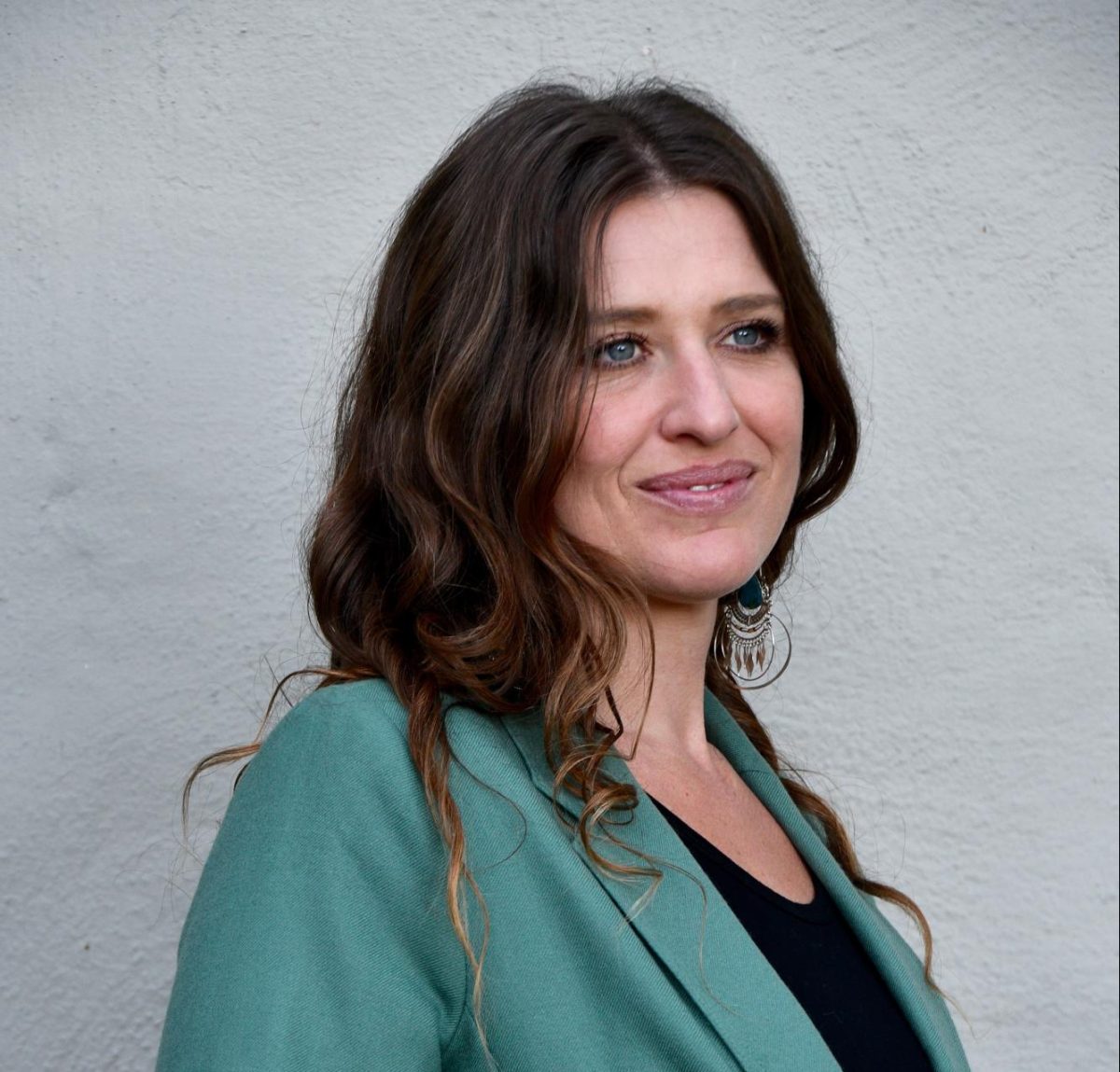
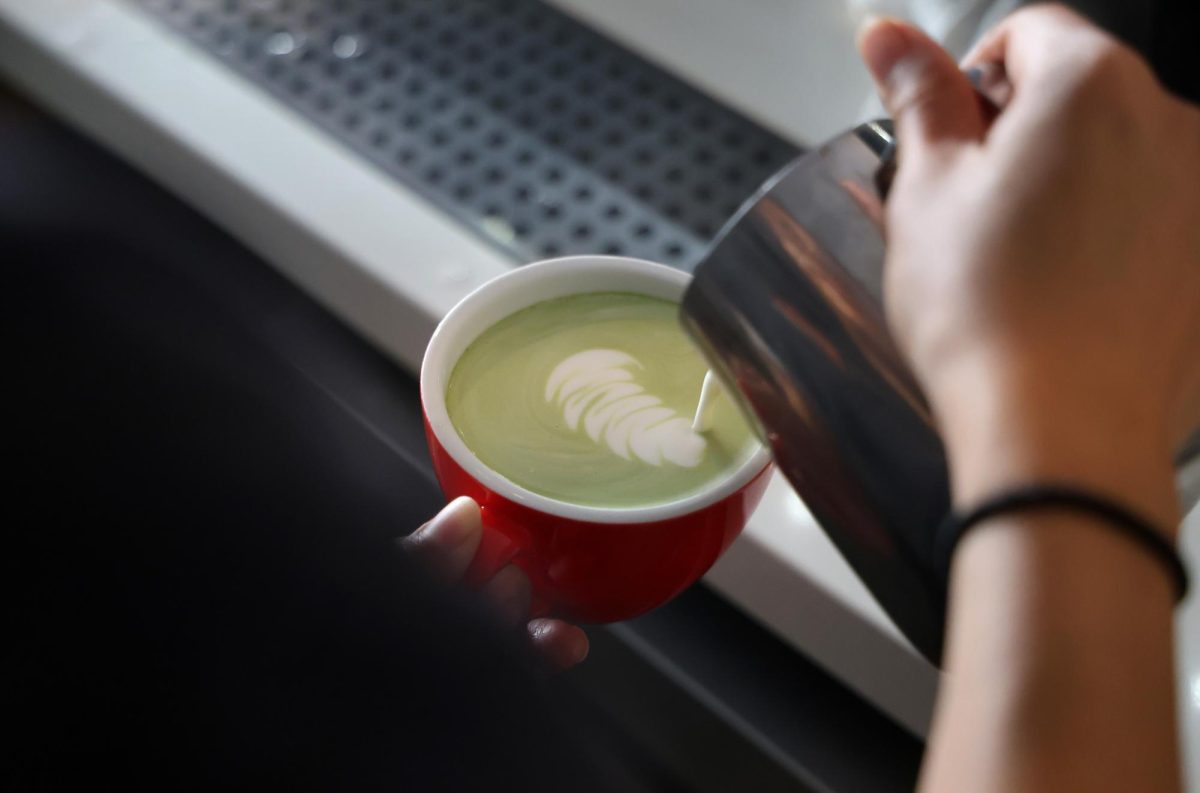
![[Video] No Trump, No Feds, No MAGA; San Francisco says "No Kings!"](https://xpressmagazine.org/wp-content/uploads/2025/10/Screenshot-2025-10-28-165913-1200x675.png)

